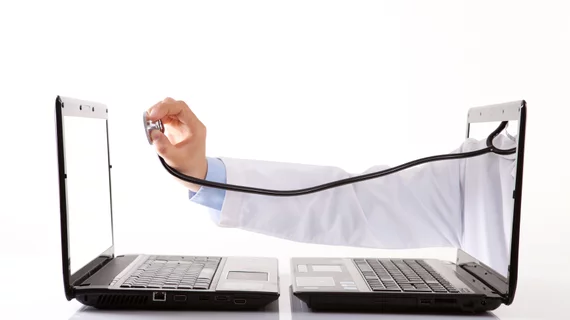Telerehab for arm motor status shows promise in stroke patients
In-home physical therapy using telehealth systems, supervised by a licensed physical therapist, is effective for stroke rehabilitation, according to a study presented May 24 at the 2018 European Stroke Organization Conference in Gothenburg, Sweden.
"Motor deficits are a major contributor to post-stroke disability, and we know that occupational and physical therapy improve patient outcomes in a supervised rehabilitation program," Steven C. Cramer, MD, of the University of California, Irvine, said in a statement. "Since many patients receive suboptimal therapy doses for reasons that include cost, availability, and difficulty with travel, we wanted to determine whether a comprehensive in-home telehealth therapy program could be as effective as in-clinic rehabilitation."
Researchers studied 124 stroke survivors who underwent six weeks of arm motor therapy. Half of the cohort received supervised in-clinic therapy and half underwent a telerehab program which was under the supervision of a licensed physical therapist.
The researchers measured the efficacy of both types of rehab using the Fugi-Meyer scale, which measures arm motor status. The subjects were on average 4.5 months post-stroke and had moderate arm motor deficits at baseline.
After 30 days of the rehabilitation program, the in-clinic study subjects had an 8.4-point improvement, on average, on the Fugi-Meyer scale, compared to an average boost of 7.9 points for those who were part of the telerehab program.
Cramer noted telerehab is “ideally suited to efficiently provide a large dose of useful rehab therapy after stroke.” Future applications of a computer-based system in the home, Cramer said, could examine longer-term treatment and treat other neurological domains affected by stroke—including language and memory.
"Getting patients to remain engaged and comply with therapy is a key measure of success of any rehabilitation program," Cramer said. "Greater gains are associated with therapy that is challenging, motivating, accompanied by appropriate feedback, interesting and relevant. Telerehab achieves this because therapy is provided through games, provides user feedback, can be adjusted based on individual needs, is easy to use—and is fun."

